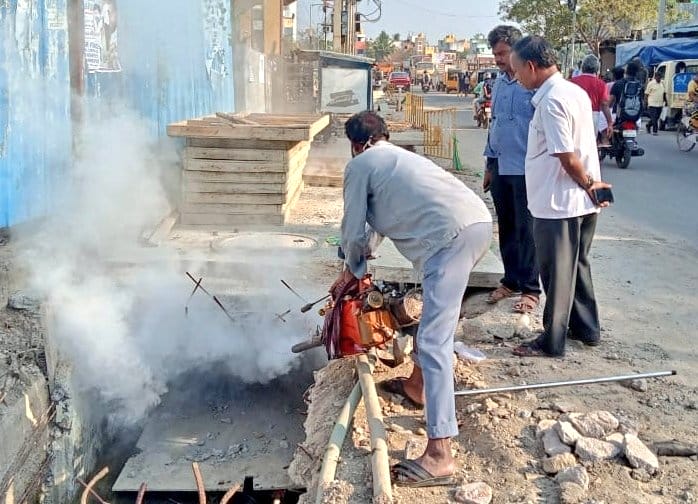Stray dog attacks 29 people in Chennai
A stray dog in Chennai bit 29 people in less than an hour in the Royapuram area before being killed by locals suspecting it might have rabies. Witnesses reported unprovoked attacks, with victims sustaining deep cuts and bleeding. Twenty-four individuals had category three bites, with possible saliva transfer. The injured, including school children and senior citizens, were admitted to a nearby hospital for rabies prevention. The Greater Chennai Corporation sent the body of the dog for postmortem at the Madras Veterinary College to determine if it was rabies-infected, given its unprovoked aggression.
Sources: Times of India | The New Indian Express
Sewage overflow in TVS Nagar raises concerns

Metro water officials in Chennai set right a sewage overflow issue in TVS Nagar, Korattur, by raising manhole heights and draining sewage water into nearby stormwater drains. The problem had been reported earlier, with residents complaining about stagnant sewage water and a foul smell. The quick fix implemented by officials involved using pumps and pipes to redirect sewage water from vacant land plots into stormwater drains. While officials claim standard measures were taken, residents allege direct drainage of sewage water into stormwater drains. A corporation official stated that such a method of draining sewage is not permissible and promised an inquiry into the matter.
Source: The New Indian Express
Read more: All that’s wrong with stormwater drains in Chennai and how to fix them
Residents express concerns over rising mosquito density in the city
Residents in Chennai are expressing concern over the increasing mosquito density in the city, pointing to inadequate mosquito control operations by the Greater Chennai Corporation. Residents claim that fogging is inconsistent, and the density of mosquitoes has risen due to uncleared garbage at commercial establishments and government agencies. Allegedly, Corporation workers have stopped visiting homes for fogging and anti-larval work after reports of dengue cases. Councillors attribute the issue to insufficient manpower, with many vacant positions not filled. The rise in mosquito breeding is also linked to uncleared garbage and stagnant rainwater in certain areas. The Corporation, despite awareness campaigns, faces challenges in eliminating breeding sources and relies on fogging and larval control measures. The civic body emphasises the need for resident cooperation in waste management to prevent mosquito-borne diseases.
Source: The Hindu
Read more: Promising signs for Adyar River after years of clean-up efforts
Proposed formation of new company for Adyar river restoration
The state of Tamil Nadu is considering the formation of a new company named Chennai Rivers Transformation Company (CRTC) to restore the Adyar River, according to submissions made in the National Green Tribunal. The proposed CRTC aims to implement projects outlined by the Chennai River Restoration Trust (CRRT) to protect and develop major water bodies, including the Adyar River. The state municipal administration department has prepared a detailed feasibility report for the river’s restoration, and a tender was floated to select a concessionaire. The new company, once approved, will undertake projects such as maintaining riverbanks, constructing walkways, cycle tracks, parking lots, and parks. Multiple state agencies involved in the Adyar River restoration claim over 80% completion of scheduled works, including waste removal and beautification. The resettlement of affected families, identified as part of the project, has progressed slowly.
Source: Times of India
Taramani U-turn flyover opens to public after delays
The city’s first U-turn flyover on Old Mahabalipuram Road (OMR) at Taramani is set to open for public use after a prolonged delay. The unidirectional flyover aims to facilitate a U-turn for vehicles travelling from Thoraipakkam to Madhya Kailash, providing a smoother route via Indira Nagar and reducing congestion. Initiated by the state government four years ago to alleviate waiting times at the TIDEL Park traffic signal and ease IT corridor congestion, the project, costing an estimated 110 crores, is a welcome move for residents. However, concerns persist about the stalled construction of the second flyover and potential gridlocks due to existing encroachments in nearby areas.
Source: Times of India
[Compiled by Athira Elssa Johnson]